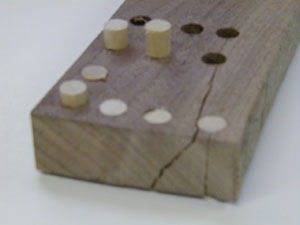For Your Child or Grandchild
Dowels and Drills
At this point you should have all the pieces of your horse carefully sanded and ready for assembly. I use wood dowels for all the joints on this horse, and some discussion of their use is necessary. Carefully fitted dowels make a very strong joint. Carefully fitted is the critical phrase. I hope you have a drill press to bore the dowel holes because it is much easier to get a quality result, although I built many horses without one in the early years. Whatever tool you choose, practice on some scrap pieces to perfect your technique. Practice, no kidding! All of these dowel ends will show, and ragged holes are a sign of careless craftsmanship.
Purchasing hardwood dowels can be very frustrating. The lumber yard variety are often of an obscure wood species and quite random in size and quality. Sometimes they are noticeably out-of-round. I use 3/8 inch diameter hickory dowels from Atlas Dowel Company. Their catalog offers a wide variety of sizes and species. Hickory is very strong, yet inexpensive. Sugar Maple and Birch are also very good. All dowels are usually somewhat rough and also vary in size from order to order and season to season.
Once you have your dowels you need some drill bits. Since dowels vary in diameter you need to match your drill bit to the dowels you will be using. I use common high speed twist drills in a variety of sizes. Most hardware suppliers sell these bits in 1/16 inch increments. These won't do, so you may need to locate a more professional hardware store. You will be looking for letter size bits. These vary by only a few thousandths of an inch in diameter. I own sizes T, U, 3/8, V, W. This range seems to fit nearly any "3/8" dowel I've found.
I also regrind the drill points to produce a brad point. Master woodworker James Krenov says, "A simple way to make what we in Europe call a cabinetmaker's drill is to regrind an ordinary straight-shank metal drill. This may sound complicated but...you can easily produce drills with a sharp center spur and very sharp, clean-cutting edges." (The Fine Art of Cabinetmaking, page 133) A center spur or brad point reduces the chance of error. I use my belt sander to regrind my drills. Some supply houses are selling brad point drills in slightly under and over sizes today. Years ago I had to make my own and still do. It's much cheaper.
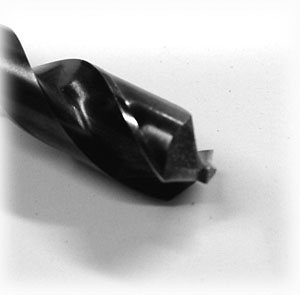
When you have your drill bits and dowels experiment with some scrap pieces of wood. You want a snug, hammered in fit, but not too tight. Too tight can split your parts, especially near the end of a piece. Too loose will not be strong enough. On a properly fitting dowel you don't get much of a second chance while driving. Don't hesitate; the glue will seize up in a very few seconds. Hammer steadily with care. Trial and error on scrap will save you costly mistakes on your horse. Practice will show you the ideal combination of drill bit and dowel.
Hickory dowels are harder than nearly any wood you can choose for your horse. This can present problems if you need to drill out a partially driven dowel. Your drill bit will tend to slide off the hard hickory and go into the softer cherry or walnut, particularly if you use a electric hand drill. If you are having trouble during practice you might want to substitute cherry dowels which are softer and easier to drill out. Cherry is not quite as strong, but it should be adequate for this horse.
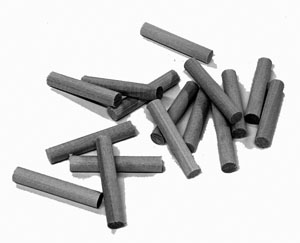
Wheresoever we landed upon this River, wee saw the goodliest Woods, as Beech, Oke, Cedar Cypresse, Wal-nuts, Sassafrass...
Cabinetmakers, Fisher
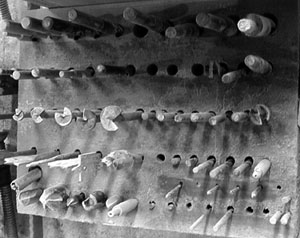
Some of my many drill bits.
Why are there trees I never walk under but large and melodious thoughts descend upon me?
Walt Whitman, Song of the Open Road
Click to watch a video of me regrinding a drill bit.
In the video I let the point of the bit rest beside the sanding belt as I rotate the bit. After grinding the point protrudes the thickness of the belt. Take it slow to avoid overheating and turn off your dust collection so sparks don't get sucked up.
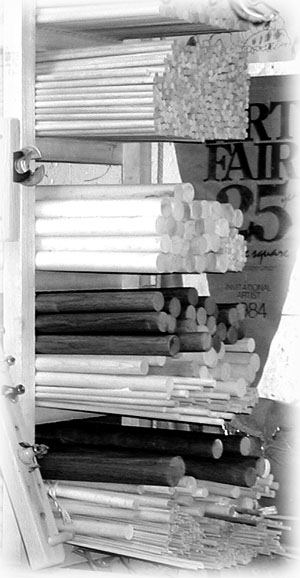
I like trees because they seem more resigned to the way they have to live than other things do.
Willa Cather (1873-1947), O Pioneers 1913
